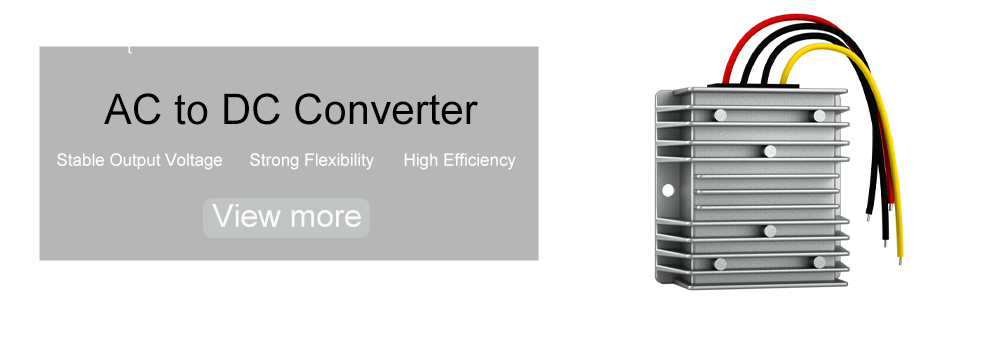AC/DC converter is a device that converts alternating current (AC) into direct current (DC) and is widely used in modern electronic devices. Its main function is to provide the AC power in the home or industrial power system to devices that require DC after a series of circuit conversions.
Unlike many devices, most electronic products such as home appliances, computers, and communication equipment require stable DC power, while the power system provides AC power. Therefore, the AC/DC converter plays the role of a bridge in this process, ensuring that AC power can be safely and stably converted into DC power suitable for equipment.

Difference between AC and DC
The fundamental difference between AC and DC lies in the waveform. The voltage direction of AC reverses periodically over time, while the voltage direction of DC remains unchanged and the direction of the flowing current is always consistent.
Although DC is very important in many electronic devices, AC has become the first choice for long-distance power transmission due to its efficient transmission and low loss. Therefore, almost all power transmission systems in modern society use AC, and electrical equipment needs to convert AC into DC to operate.
Principle of AC/DC Converter
The working principle of AC/DC converter is relatively simple. It first converts AC power into pulsating DC power through a rectifier, then removes the pulsation through a filter, and finally obtains smooth DC power.
The core task of the converter is to efficiently convert the input current and voltage from the AC state to DC while maintaining high efficiency and minimizing losses. Usually, the output voltage of the converter is further stabilized by the regulation circuit to meet the precise voltage and current requirements of the device.
But it should be noted that AC/DC converters involve multiple challenges in the operation process. First, the conversion between traditional AC and DC power will produce a certain amount of energy loss, which requires designers to optimize efficiency as much as possible during the design process. Second, due to the high switching frequency, the converter often generates electromagnetic interference (EMI), which affects the normal operation of the equipment.
Therefore, modern AC/DC converters must not only solve the conversion efficiency problem, but also must take into account electromagnetic compatibility (EMC) to ensure that the converter can still operate stably under high frequency, high voltage and high current.
Wide application
With the advancement of technology, the design of AC/DC converters has become more and more sophisticated. The application of new materials such as high-frequency switching power supplies, silicon carbide (SiC) and gallium nitride (GaN) enables AC/DC converters to operate at higher efficiency, reduce heat dissipation and improve the stability of equipment.

Especially in the fields of electric vehicles, solar power generation, smart homes, etc., the high efficiency and miniaturization design of AC/DC converters are becoming more and more important. Efficient AC/DC converters can not only provide stable power supply for equipment, but also reduce energy consumption and system costs, which meets the requirements of modern society for energy conservation and environmental protection.
In addition to traditional household appliances, AC/DC converters also have a place in industrial applications. For example, in the fields of industrial automation, process control, communication equipment, etc., AC/DC converters are used to provide power for various control systems, motor drives, sensors and other important equipment.
These applications have high requirements for the stability, efficiency and safety of the power supply, so the design of AC/DC converters must take into account more complex working environments and more stringent technical requirements.
When designing AC/DC converters, in addition to power conversion efficiency, designers also need to consider multiple factors, such as input voltage fluctuations, output current stability, and heat dissipation of equipment.
In addition, the selection of AC/DC converters also needs to select appropriate output voltage and current according to different requirements of the load to ensure that the converter will not be overloaded during operation and ensure long-term stable operation of the equipment.
With the rise of emerging technologies such as the Internet, the Internet of Things, and smart grids, the application areas of AC/DC converters are constantly expanding. Especially in the field of smart home and smart office, with the popularity of various low-power devices, the demand for AC/DC converters is also increasing.
These devices often need to operate in a low-power, high-efficiency power supply environment, so designing more efficient and energy-saving AC/DC converters has become an important direction for the development of the industry.
Modern society has higher and higher requirements for power equipment, and the technological innovation of AC/DC converters is a response to these demands.
Its efficiency improvement, function optimization and miniaturization will provide stronger support for all walks of life and promote the development of various smart devices and energy-saving and environmental protection technologies.
With the continuous evolution of technology, AC/DC converters will play an increasingly important role in the future, bringing more innovative applications to industries such as smart homes, electric vehicles, and renewable energy.






